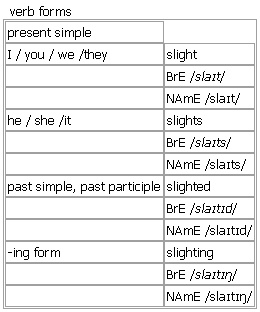|
Từ điển Oxford Advanced Learner 8th
 slight
slight

slight [slight slights slighted slighting slighter slightest] adjective, noun, verb BrE [slaɪt] NAmE [slaɪt]
adjective (slight·er, slight·est)
1. very small in degree
•a slight increase/change/delay/difference
• I woke up with a slight headache.
• The damage was slight.
•She takes offence at the slightest thing (= is very easily offended).
•There was not the slightest hint of trouble.
•He is, without the slightest doubt, the greatest living novelist.
•He never had the slightest intention of agreeing to it.
•The picture was at a slight angle.
•A slight breeze was blowing.
2. small and thin in size
•a slight woman
•He was of slight build.
•She was smaller and slighter than I had imagined.
3. (formal)not deserving serious attention
•This is a very slight novel.
Word Origin:
Middle English; the adjective from Old Norse sléttr ‘smooth’ (an early sense in English), of Germanic origin; related to Dutch slechts ‘merely’ and German schlicht ‘simple’, schlecht ‘bad’; the verb (originally in the sense ‘make smooth or level’), from Old Norse slétta. The sense “treat with disrespect” dates from the late 16th cent.
Thesaurus:
slight adj.
•The damage was slight.
small • • modest • • minimal • • minor • • marginal • |especially written negligible • • insignificant • |especially spoken little •
Opp: big, Opp: major
a/an slight/small/modest/minimal/minor/marginal/insignificant/little change/difference/improvement
a/an slight/small/minor/insigificant/little problem
a slight/small/minor/little error/mistake/defect/accident
a slight/small/minimal chance
Slight or small? Use either word to talk about changes or problems. Use slight but not small to talk about medical problems, feelings or things that affect the senses; use small but not slight to talk about amounts
•a slight cold/headache/movement/touch
• a small amount/number/quantity, etc.
Example Bank:
•She looked very slight, almost fragile.
•She never had the slightest intention of agreeing.
•She smiled to hide her slight embarrassment.
•She spoke with a slight foreign accent.
•She takes offence at the slightest thing.
•The accident had left him with a slight limp.
•The eyes of predators are highly sensitive to the slightest movement.
•The slight figure of a woman emerged from the house.
•The slightest noise will wake him.
•The slightest touch will set off the alarm.
•There's been a slight increase in the number of unemployed in this area.
•Unfortunately, this plate has a slight flaw in it.
•You may experience some slight discomfort after the operation.
Idiom: ↑not in the slightest
Derived Word: ↑slighting
noun ~ (on sb/sth)
an act or a remark that criticizes sth or offends sb
Syn: ↑insult
• Nick took her comment as a slight on his abilities as a manager.
Word Origin:
Middle English; the adjective from Old Norse sléttr ‘smooth’ (an early sense in English), of Germanic origin; related to Dutch slechts ‘merely’ and German schlicht ‘simple’, schlecht ‘bad’; the verb (originally in the sense ‘make smooth or level’), from Old Norse slétta. The sense “treat with disrespect” dates from the late 16th cent.
verb usually passive ~ sb
to treat sb rudely or without respect
Syn: ↑insult
• She felt slighted because she hadn't been invited.
Verb forms: 
Word Origin:
Middle English; the adjective from Old Norse sléttr ‘smooth’ (an early sense in English), of Germanic origin; related to Dutch slechts ‘merely’ and German schlicht ‘simple’, schlecht ‘bad’; the verb (originally in the sense ‘make smooth or level’), from Old Norse slétta. The sense “treat with disrespect” dates from the late 16th cent.
|
|
|
▼ Từ liên quan / Related words
Related search result for "slight"
|
|
